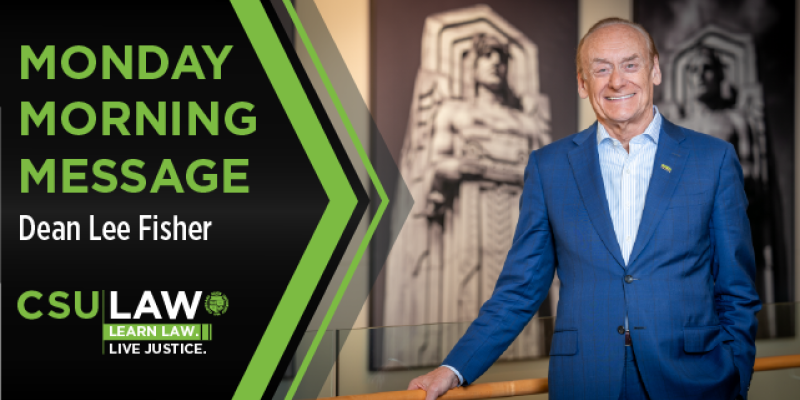
Our hearts break for the innocent victims and their loved ones in El Paso and Dayton. There are countless lessons to be learned from these and other horrific tragedies, and I’ll have much more to say about gun violence, hate crimes, and domestic terrorism in a future Monday Morning Message.
This morning, I want to discuss another threat to our democracy, safety, and way of life – cybercrime. Every day, we are reminded that we live in an uncertain world with an uncertain future.
“A major attack on our cyber systems could shut down our critical infrastructure - financial systems, communications systems, electric grids, power plants, water treatment centers, transportation systems and refineries - that allows us to run our economy and protect the safety of Americans.” - Dan Coats, Director of National Intelligence
A data breach to Capital One servers recently exposed the personal information of nearly 106 million customers and credit applicants. News of this breach comes on the heels of the Federal Trade Commission's announcement of the $700 million settlement it reached with Equifax to compensate the 147 million people who were affected by the 2017 hack of the credit-monitoring service.
I’m very proud that CSU Cleveland-Marshall College of Law is a national leader in cybersecurity and privacy protection. The policy, legal, business and technical issues breaches like these raise were the focus of Cleveland-Marshall's Center for Cybersecurity & Privacy Protection's fourth annual conference on May 30-31,2019.
Over 200 law, business and technology professionals attended our two-day event, which opened with a keynote fireside chat between Federal Trade Commissioner Rebecca Kelly Slaughter and our Center Director Professor Brian Ray and closed with a discussion of biometrics, national security and privacy with U.S. Department of Homeland Security (DHS) Assistant Director for Futures Identity John Boyd and DHS Counsel Terry Check. The other 10 sessions featured over 40 experts who addressed topics ranging from new state data security and privacy laws, to incident response and cyber risk insurance. Details about the event, including videos of each session are available on our conference website.
Our conference capped off a busy year for our Cybersecurity Center. In March, Professor Jonathan Witmer-Rich and Director Ray co-organized with Urban Studies Professors Joe Mead and Nick Zingale and rising 4LE student Jackson Biesecker, recent law graduates Dana Beveridge ’19 and Melissa Bilancini ‘19 and recent Urban Studies M.A. graduate Marissa Pappas, a Workshop on Facial Recognition & Privacy featuring privacy and civil liberties advocates as well as experts from DHS, FBI and several state and local governments that have developed policies and programs to address the privacy concerns raised by facial recognition and other surveillance technologies.
Other highlights of our C|M|LAW Center for Cybersecurity and Privacy Protection include:
- Rising 3L Law students Pat Lipaj and Elliot Nash created the new Blockchain Law & Business Association, which published a periodic newsletter throughout the year. That group will merge this year with the new Cyberlaw Student Association established by Rising 1L Jameson Tibbs to create a single group for law and business graduate students interested in technology.
- CSU Monte Ahuja College of Business Professor Janine Spears and Center Director Ray piloted a new Cybersecurity Risk Assessment and Compliance course this spring that trained a team of law and business students to conduct a cybersecurity risk assessment for a local non-profit. Cleveland-Marshall Law Students, Rebecca Christian-Lipker and Rob Thomas formed a team with College of Business Master of Information Sciences student Michael Potocar and conducted the assessment for Lutheran Metropolitan Ministry (LMM).
· Center Founding Co-Director and Emerita Law Professor Candice Hoke continued her important work advocating for increased election cybersecurity. She was interviewed by several media outlets, including, The Guardian, Marketplace Tech and NPR. She also provided expert testimony in several matters, including litigation related to the State of Georgia's voting machines.
- The Center also co-organized with the Ohio State University Moritz College of Law a 1/2-day discussion of the new Ohio Data Protection Act (ODPA), which Center Director Ray helped to draft as part of his work on the CyberOhio Advisory Board. The event was underwritten by Microsoft Corp. which also sponsored an in-depth analysis of the ODPA co-authored by Professor Ray and OSU Law Professor Dennis Hirsch.
- Center Director Ray also recently co-authored The Sedona Conference Commentary on Application of Attorney-Client Privilege and Work-Product Protection to Documents and Communications Generated in the Cybersecurity Context.
Note: Equifax customers can claim either an automatic $125 payment or free credit monitoring and, with documentation, additional costs for time and money spent protecting their identity. Capital One has promised to contact customers who may have had their information stolen.
*This Week’s Monday Moment: 3 TED Talks on Cybersecurity You Should See
Have a great day. Have a great week.
For copies of past messages, please go to this link: Monday Morning Messages.
Subscribe to Dean's Monday Morning Message
Subscribe to C|M|Law Newsletter
My views in all my Monday Morning Messages are my personal views alone and do not reflect the views of our law school or our university.
My best,
Lee
